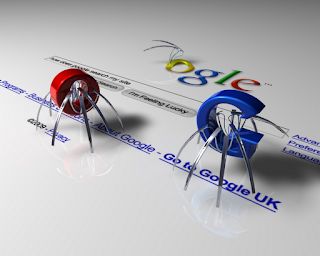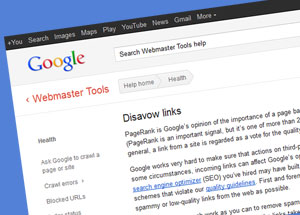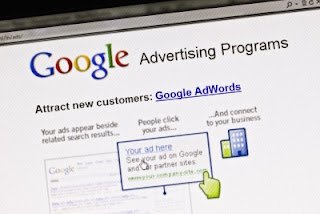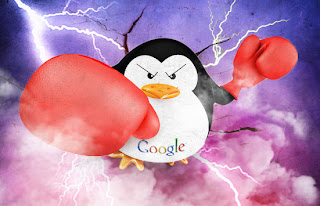Tampilkan postingan dengan label SEO. Tampilkan semua postingan
Tampilkan postingan dengan label SEO. Tampilkan semua postingan

A great thing about Google is, it gives webmasters all the help they need to get their websites into Google's index. There's a nice tool available in Google Webmaster Tools called 'Fetch as GoogleBot'. This tool, as we discussed in our SEO Tips for start-ups, can be a great help diagnosing errors and getting a website in Google's index faster. A robots.txt file is used for crawling efficiency, and preventing certain pages from being crawled etc. Sometimes though, GoogleBot might have difficulty fetching your robots.txt file. Here's a solution from Google to this problem.
Read more »
What has having your own blog taught you about SEO?
Unknown | 11.27 |
Blogging tips
,
SEO

If you have any interest in the web-development industry, you will find that there are countless entries on the internet about Search Engine Optimization (SEO) - from so-and-so hot SEO tactics to the best SEO practices, and so on. There are also tonnes of blogs and websites like Search Engine Land, SEOmoz etc that provide SEO tools, guides, tips, and more. But can you learn all about SEO from these sources? For a person working in the SEO industry, or working as a SEO, is it necessary for him to have a blog or a website? Have you learned something about SEO that you wouldn't know if you haven't had your own blog?
Read more »

We often hear and use the term Search Engine Optimization (SEO) with regards to blogging / website designing, and getting content on Google. But what is the first thing that comes to mind when you hear this word? A lot of people picture link building and other such practices, which kind of limits their imagination and their field. But comparing its actual meaning to the way it is used today, do you think there's any difference between the two? And do you think the name is descriptive of the way it is used these days? Or should it be renamed appropriately? Here's Google's viewpoint on the matter.
Read more »

Google rolls out its algorithmic updates on a regular basis now. And it impacts a lot of websites positively, as well as negatively. Although the negative effect might be because of shady practices or spam action, it could also be a mistake, for which Google offers webmasters an option to file a reconsideration report. So if you think your website has been unduly penalized, or maybe if there's a misconception from Google's side, you can use this option. But some people have been submitting and submitting reconsideration requests, but don't hear anything about it for weeks, or even months. So how long does Google take to actually process a reconsideration request?
Read more »

Campaign tags, also known as URL parameters, are a way of telling apart different variables, such as a visitor's source, or affiliate id, or something similar. Hence, they are used for tracking purposes. These tags or parameters change the URL, even if they might point to the same content. For example www.example.com and www.example.com?ref=1234, both might point to the same webpage. So the important question is, how does Google treat such URLs? It is logical to think about them as two different URLs, since there's an added key-value pair. And some parameters even change the content on a webpage. So how does Google interpret such links that have a campaign tag? Does it consider them as the same page or not? And what are the SEO effects of inbound links?

Are site-wide backlinks good or bad for your website? People are often confused by the question, and most are under the impression that the more the backlinks to a website, the better, no matter whether they are from the same, or a different domain. And judging from a crawler's point of view, it seems logical, since crawlers crawl each link on a page, and then follow the link to the linked page, and a backlink is registered for that page if it's external. But is it worth back-linking to a site more than once? More importantly, does it have any pitfalls?

By far, the most popular method of acquiring links among webmasters is guest blogging. People write for other websites in exchange for links to their own websites. This not only gives people a backlink, it also gives them a small increase in traffic, hence making it a favorite among bloggers. But sometimes, it seems a bit too easy, as anyone can pick up content from the internet and submit a guest post about it. And since the practice is widely used, a lot of spammy activity is bound to surface at one time or another. So what does Google do about it? Will it penalize websites for links acquired through guest blogging?
Read more »

Mobile devices such as Smartphones, and especially Tablets, are now fast becoming more and more popular, and although nowhere near replacing desktops, they do seem to be gaining up on browser statistics. Now, they have more than 10% of the share, with Tablets almost as much being used as smartphones. This makes optimizing websites for mobile devices all the more important. But tablet users now don't want you to return a mobile version of your website to them. They want the desktop experience. But although there are no official guidelines from Google on creating search engine and user friendly tablet-optimized site, there are a few tips you can apply to make your website work across multiple platforms.
Read more »

Are you thinking about launching a new website, or maybe a service or an online store? If yes, then chances are that you might want to take the initial phase of setting up a domain and website a bit more seriously than you'd ordinarily do. Ever opened a webpage, only to find that it is no where to be found on the internet? That's because there's nothing on that domain at present. Worse still is the parked domain page, advertising the hosting company, which makes you think you've finally landed onto an existing page, only to realize that it is no good either. So what sort impression do you want to give to people who know of your newly launched domain's existence, and would like to know more? Is parking the domain a sensible idea?
Read more »

So, Google PageRank has been updated again this week, just as expected. And so far, the update does not seem to be a major one - but then again, give it some time. The last update took place in August 2012, and the one before that on May 2012. So it's pretty obvious that Google is now rolling out these updates quarterly, i.e. after every three months. So the next update is expected in the first 10 days of February 2013. We congratulate everyone whose PR didn't drop. And for those whose did, there's a few things you can do which we will mention. And again, keep in mind that Google PR should not a priority for you - read on to see why.
Read more »

As we have previously discussed, Google recently launched a Disavow Links Tool. Using this tool, bloggers and webmasters can 'disavow', or disinherit some selected incoming links to their websites, so that Google won't consider those links when evaluating the website. The idea is to prevent spam-backlinking, that can bring down a website's ranking, because Google considers the quality of the backlinks to a website more than the quantity, and hence penalizes for bad or spam linking. So for any malicious websites trying to link to your site, their links can easily be disregarded. But before you go on disavowing every link that looks suspicious to you, there are a few things you should be mindful of first.

Making sub-domains on a domain has now become pretty popular, and many bloggers are now using sub-domains to create custom pages, such as contact and about pages. Although they look professional (and classy :P), they raise a concern. Usually, they are not part of a theme or template, and are custom designed. So some of the on-page SEO elements might be present. And Google Panda and Penguin is said to be domain-level penalty, with one low quality page effecting the whole site. So the popular question arises; how does Google view these sub-domains? And what is the difference, if any, between sub-directory structure and sub-domain structure?

Okay. So this is an important question that many people have now started asking: Do Human "Quality Raters" Influence which sites are impacted by Panda? You might have heard of a manual penalty for a site, and in our post about removing backlinks to avoid penalty, we talked about when a website gets hit by an algorithm, and when a site gets manually penalized. This concept gives rise to a common question: if these 'quality raters' influence whether a website gets impacted by an algorithmic update, such as Panda or Penguin, then how is the consumers' reaction gauged? Meaning who is to say which site gets penalized and which doesn't?
Read more »

Do AdWords Customers get special treatment in organic search results? This is a question that's become quite common now among webmasters, especially those advertising their website with Google AdWords. And that's understandable, considering the money they spend in doing so. A lot of people also think that if someone buys that ad spot on the right side of the page, then his website gets some sort of an algorithmic boost, and gets an advantage over others and thus ranks higher. Is there any truth to it? And if so, is it any fair to the other webmasters? Google answers this important question in a latest video uploaded by Matt Cutts.

As you all know, Google is pretty hard-up about duplicate content, now more than ever, because an awful lot of blogs and websites have started making money by blatantly copying material from other sources. This not only is unfair to the original source, it also jeopardizes the integrity of search results returned by Google. Hence the stringent TOS (Terms of Service). But what about adding quotations, or sentences/paragraphs quoted from other websites? It does classify as content copied directly from another website. So how does Google treat such content and is it safe to include it on your website? Well, Google just released a video explaining how Google treats such content.
Read more »

Yesterday, we talked about whether or not bad links on your site are worth deleting. The simple answer to the question was, you might as well do it, but it'll be better to adjust your website, rather than trying to bend it. If you've been manually penalized, then this step becomes more or less necessary. But what about the links to your website, which aren't in your control? Luckily, Google has now released a link Disavow tool, which will solve such problems. Quite simply, any unnatural links to your site can be disinherited, or 'disavowed', hence preventing Google from considering them.
Read more »

Google Panda and Penguin have been some of the most infamous algorithmic updates Google has ever made. They have effected tonnes of websites and blogs, and are still working to devour any website with malpractice that comes their way. We have many times discussed about how to avoid penalty from such algorithm updates. And in them, we have talked a lot about Google's interest in you links, out bound and incoming both. It's common knowledge that Google is now concentrating a lot more on the quality of the links than on the quantity. So a common question easily arises: If you are hit by a penalty, does it help to remove your backlinks?
Why Breadcrumbs are not SEO Friendly for your Blog?
Unknown | 12.09 |
SEO
,
Webmaster Tools
 No one knew that a simple Breadcrumb used in the fairyTale of "Hansel and Gretel" would become a website element one day. Breadcrumbs or breadcrumb trail is a navigation system used in websites that offer more usability to the visitor. They appear horizontally above Post titles or below headers. They show user location and tells him what post and which section of the blog category he is on. Breadcrumb provides links back to the pages the user already visited in hierarchical order. Often a colon ( : )or slash ( / ) or even a greater-than sign ( > ) is used as hierarchy separator. These are now widely used by blog owners in both Wordpress and Blogger platforms. Unfortunately Breadcrumbs destroy the advantages of Permalinks which play great role in targeting rich keywords. Blogger Team has introduced permalinks on all blogspot blogs and we already discussed several ways of optimizing permalinks, now it's the right time to realize how Trailing links effect permalink display in SERPs.
No one knew that a simple Breadcrumb used in the fairyTale of "Hansel and Gretel" would become a website element one day. Breadcrumbs or breadcrumb trail is a navigation system used in websites that offer more usability to the visitor. They appear horizontally above Post titles or below headers. They show user location and tells him what post and which section of the blog category he is on. Breadcrumb provides links back to the pages the user already visited in hierarchical order. Often a colon ( : )or slash ( / ) or even a greater-than sign ( > ) is used as hierarchy separator. These are now widely used by blog owners in both Wordpress and Blogger platforms. Unfortunately Breadcrumbs destroy the advantages of Permalinks which play great role in targeting rich keywords. Blogger Team has introduced permalinks on all blogspot blogs and we already discussed several ways of optimizing permalinks, now it's the right time to realize how Trailing links effect permalink display in SERPs.10 WhiteHat Blogging Tips For Bloggers by Matt Cutts
Unknown | 12.09 |
Blogging tips
,
SEO

You will find countless blogging and SEO tips online and on this blog. If you don't trust the credibility of what other say, then you can take it from Matt Cutts, the Google guy. He is the head of the web-spam team at Google, so he definitely knows what he is talking about, as he is the person in charge of controlling what blogs get a good spot in SERPs and what blogs get penalized due to over-optimization or other SEO or blogging mistakes. During his one-hour lecture at a WordPress Camp, he shared some blogging tips and ideas that we feel worth re-sharing with other people who weren't there or didn't see the video.
Read more »
The Funny Matt Cutts on Whitehat SEO tips for Bloggers
Unknown | 12.09 |
Blogging tips
,
SEO

How much about SEO can you learn in an hour? Apparently, a lot, as the head head of Google's webspam team, Matt Cutts demonstrates (yes, he's the guy that's probably ruined your blog after the Panda and Penguin updates :P). But it's all for the better, because quality is now Google's priority. And there's a lot to be learned from the maybe-not-so-evil-after-all Matt Cutts. During an interactive session at a WordPress camp, he humors his audience for an hour with some Whitehat SEO tips and strategies that webmasters can apply to climb up the ladder. The major topics discussed were SEO keyword and security tips, pros and cons of Google Analytics and Webmaster Tools, migrating to a new web-host, and of course, some WordPress plugin recommendations. Bloggers would definitely benefit from these tips.
Read more »













